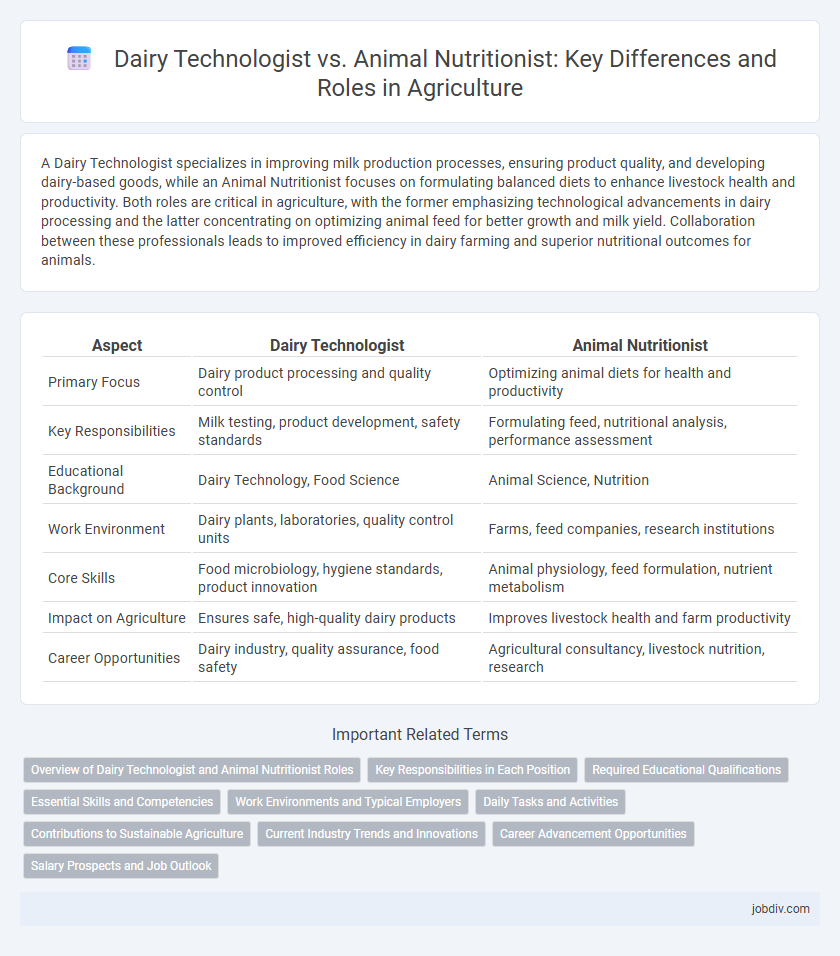A Dairy Technologist specializes in improving milk production processes, ensuring product quality, and developing dairy-based goods, while an Animal Nutritionist focuses on formulating balanced diets to enhance livestock health and productivity. Both roles are critical in agriculture, with the former emphasizing technological advancements in dairy processing and the latter concentrating on optimizing animal feed for better growth and milk yield. Collaboration between these professionals leads to improved efficiency in dairy farming and superior nutritional outcomes for animals.
Table of Comparison
| Aspect | Dairy Technologist | Animal Nutritionist |
|---|---|---|
| Primary Focus | Dairy product processing and quality control | Optimizing animal diets for health and productivity |
| Key Responsibilities | Milk testing, product development, safety standards | Formulating feed, nutritional analysis, performance assessment |
| Educational Background | Dairy Technology, Food Science | Animal Science, Nutrition |
| Work Environment | Dairy plants, laboratories, quality control units | Farms, feed companies, research institutions |
| Core Skills | Food microbiology, hygiene standards, product innovation | Animal physiology, feed formulation, nutrient metabolism |
| Impact on Agriculture | Ensures safe, high-quality dairy products | Improves livestock health and farm productivity |
| Career Opportunities | Dairy industry, quality assurance, food safety | Agricultural consultancy, livestock nutrition, research |
Overview of Dairy Technologist and Animal Nutritionist Roles
Dairy Technologists specialize in the processing, quality control, and safety of milk and dairy products, ensuring compliance with industry standards and advancing product innovation. Animal Nutritionists focus on formulating balanced diets to optimize animal health, growth, and productivity, using knowledge of feed composition and digestive physiology. Both roles contribute to sustainable dairy farming by improving product quality and animal welfare.
Key Responsibilities in Each Position
Dairy Technologists specialize in optimizing milk production processes, ensuring product safety, quality control, and developing new dairy products through advanced processing techniques. Animal Nutritionists focus on formulating balanced diets, analyzing feed composition, and improving livestock health and productivity by enhancing nutrient intake. Both roles collaborate to enhance overall farm efficiency, with Dairy Technologists concentrating on post-production quality and Animal Nutritionists emphasizing feed and animal welfare.
Required Educational Qualifications
Dairy Technologists typically require a bachelor's degree in dairy technology, food science, or a related field, with specialized knowledge in milk processing and quality control. Animal Nutritionists generally hold degrees in animal science, nutrition, or veterinary science, emphasizing the formulation of balanced diets and feed efficiency. Advanced certifications or master's degrees enhance expertise and career prospects in both fields.
Essential Skills and Competencies
Dairy Technologists require expertise in milk processing techniques, quality control, and food safety standards to ensure the production of high-quality dairy products. Animal Nutritionists specialize in formulating balanced diets, understanding digestive physiology, and evaluating feed efficiency to optimize livestock health and productivity. Both roles demand strong analytical skills, knowledge of regulatory compliance, and proficiency in data interpretation to enhance dairy farm performance.
Work Environments and Typical Employers
Dairy Technologists often work in laboratories, dairy processing plants, and food manufacturing companies, focusing on product quality and safety. Animal Nutritionists typically operate on farms, ranches, research institutions, and feed companies, specializing in developing balanced diets for livestock health and productivity. Both professions frequently collaborate with agricultural universities and government agencies involved in food production and animal welfare.
Daily Tasks and Activities
Dairy Technologists specialize in processing and enhancing milk products, conducting quality control tests, and developing new dairy-based foods to ensure safety and nutritional value. Animal Nutritionists focus on formulating balanced diets, analyzing feed components, and monitoring livestock health to optimize growth and productivity. Both roles require strong knowledge of biology and chemistry but apply it differently--Dairy Technologists in food science and production, Animal Nutritionists in animal diet and welfare.
Contributions to Sustainable Agriculture
Dairy technologists enhance sustainable agriculture by developing innovative milk processing techniques that reduce waste and improve product shelf life, promoting efficient resource use. Animal nutritionists contribute by formulating balanced diets that optimize livestock health and productivity, minimizing environmental impact through reduced methane emissions and nutrient runoff. Together, their expertise supports resilient farming systems with improved animal welfare and lower ecological footprints.
Current Industry Trends and Innovations
Dairy Technologists are increasingly integrating precision fermentation technologies and automated milking systems to enhance dairy product quality and safety, reflecting a surge in innovation within the dairy processing sector. Animal Nutritionists are focusing on developing sustainable feed formulas using alternative protein sources like insect meal and algae, responding to industry demands for eco-friendly livestock nutrition solutions. Both roles are pivotal in advancing the dairy industry's efficiency and environmental sustainability through cutting-edge research and biotechnology.
Career Advancement Opportunities
Dairy Technologists can advance by specializing in product development, quality control, and regulatory compliance within the dairy industry, often moving into managerial or research roles. Animal Nutritionists have career growth opportunities through roles in research, feed formulation, and livestock health management, with potential progression into consulting, academic, or corporate sectors. Both careers offer diverse pathways, but Animal Nutritionists may experience broader opportunities due to their impact on overall animal health and agricultural sustainability.
Salary Prospects and Job Outlook
Dairy Technologists typically earn a median salary ranging from $45,000 to $65,000 annually, with job prospects growing steadily due to increased demand for dairy product innovation and quality control. Animal Nutritionists command a slightly higher salary average of $50,000 to $70,000, driven by the critical role they play in optimizing livestock health and productivity amid growing emphasis on sustainable farming. Both careers offer promising job outlooks, but Animal Nutritionists benefit from broader opportunities across livestock sectors and emerging trends in precision feeding technology.
Dairy Technologist vs Animal Nutritionist Infographic

 jobdiv.com
jobdiv.com